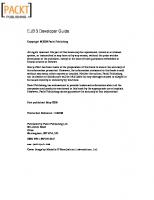Communication Patterns: A Guide for Developers and Architects 9781098140540
Having a great idea or design is not enough to make your software project succeed. If you want stakeholders to buy into
166 87 12MB
English Pages 303 Year 2023
Table of contents :
Preface
Why I Wrote This Book
Who Should Read This Book
How to Read This Book
Images and Color
Software Tools
Polyglot Media
Conventions Used in This Book
Using Code Examples
O’Reilly Online Learning
How to Contact Us
Acknowledgments
I. Visual Communication
1. Communication Essentials
Know Your Audience
Mixing Levels of Abstraction
Representational Consistency
Summary
2. Clarify the Clutter
Color Overload
Boxes in Boxes in Boxes
Relationship Spiderweb
Balance Text
Summary
3. Accessibility
Relying on Color to Communicate
Include a Legend
Appropriate Labels
Summary
4. Narrative
The Big Picture Comes First
Match Diagram Flow to Expectations
Clear Relationships
Summary
5. Notation
Using Icons to Convey Meaning
Using UML for UML’s Sake
Mixing Behavior and Structure
Going Against Expectations
Summary
6. Composition
Illegible Diagrams
Style Communicates
Misleading Composition
Create a Visual Balance
Summary
II. Multimodal Communication
7. Written Communication
Simple Language
Acronym Hell
Structured Writing
Syntax of Technical Writing
Strong Verbs
Short Sentences
Precise Paragraphs
Consistent Vocabulary
Audience Empathy
Summary
8. Verbal and Nonverbal Communication
Encoding Messages
Using the Acceptance Prophecy
Giving Your Full Attention
Using Body Language and Gestures
Decoding Messages
Battling Bias
Confirmation bias
Hindsight bias
Groupthink
Being Present
Awareness of Cultural Differences
Influence and Persuasion
Summary
9. The Rhetoric Triangle
Ethos
Establish Your Credentials
Use Trustworthy Sources
Be Transparent
Demonstrate Your Knowledge
Pathos
Tell a Story
Speak from the Heart
Use Vivid Language and Strong Imagery
Logos
Use Data and Facts
Make Logical Connections
Use Reasoning and Argumentation
Summary
III. Communicating Knowledge
10. Knowledge Management Principles
Products over Projects
Project Mindset
Product Mindset
Abstractions over Text
Lists
Tables
Visual Abstractions
Word Clouds
Charts, Graphs, and Diagrams
Other Abstractions
Perspective-Driven Documentation
DRY Perspectives
Fractal Perspectives
Implementing Perspectives
Summary
11. Knowledge and People
Get Feedback Early and Often
Share the Load
Nonproprietary Formats
Accessibility
Collaboration
Roles and Responsibilities
Further Techniques
Just-in-Time Architecture
Summary
12. Effective Practices
ADRs
ADR Structure
Title and filename
Status
Context
Evaluation Criteria
Options
Decision
Implications
Consultation
ADR Content
ADR Storage
ADR Culture
Architecture Characteristics
All Documentation as Code
Technical Documentation
Automatically Generated Documentation
Other Documentation
Summary
IV. Communicating Remotely
13. Remote Time
Synchronize Time
Time Zone
Empathy and Compromise
Split Shifts
Respect Working Patterns
Communicate Availability
Defend Part-Time Hours
Plan for Holidays
Account for Geography and Culture
Recognize Real Working Capacity
Improve Energy and Productivity
Control Notifications
Automate Tasks
Work with Others’ Rhythms
Schedule for Energy
Summary
14. Remote Principles
Meetings to Sync
Synchronous Versus Asynchronous
Enhance Meetings
Async to Think
Async Advantages
Async Obstacles
Direction Matters
Async Methods
Enhance Async
Remote-First Working
Remote-First Versus Remote-Friendly
Remote-First Benefits
Evolving to Remote-First
Summary
15. Remote Channels
Symmetrical Email
Email Reasons
Email Expectations
Email Clarity
Email Tips
Online Presentations
Audience Engagement
Presentation Content
Screen Shares
Remote Tools and Governance
Selection Techniques
Remote Tools
Data Proliferation
Security
Tool Efficiency
Tool Governance
Summary
Epilogue
A. ADR Templates
ADR Structure
Identifier and Title: A Statement of the Decision Made
Status
Context
Evaluation Criteria
Options
Decision
Implications
Consultation
ADR Options
Index
Preface
Why I Wrote This Book
Who Should Read This Book
How to Read This Book
Images and Color
Software Tools
Polyglot Media
Conventions Used in This Book
Using Code Examples
O’Reilly Online Learning
How to Contact Us
Acknowledgments
I. Visual Communication
1. Communication Essentials
Know Your Audience
Mixing Levels of Abstraction
Representational Consistency
Summary
2. Clarify the Clutter
Color Overload
Boxes in Boxes in Boxes
Relationship Spiderweb
Balance Text
Summary
3. Accessibility
Relying on Color to Communicate
Include a Legend
Appropriate Labels
Summary
4. Narrative
The Big Picture Comes First
Match Diagram Flow to Expectations
Clear Relationships
Summary
5. Notation
Using Icons to Convey Meaning
Using UML for UML’s Sake
Mixing Behavior and Structure
Going Against Expectations
Summary
6. Composition
Illegible Diagrams
Style Communicates
Misleading Composition
Create a Visual Balance
Summary
II. Multimodal Communication
7. Written Communication
Simple Language
Acronym Hell
Structured Writing
Syntax of Technical Writing
Strong Verbs
Short Sentences
Precise Paragraphs
Consistent Vocabulary
Audience Empathy
Summary
8. Verbal and Nonverbal Communication
Encoding Messages
Using the Acceptance Prophecy
Giving Your Full Attention
Using Body Language and Gestures
Decoding Messages
Battling Bias
Confirmation bias
Hindsight bias
Groupthink
Being Present
Awareness of Cultural Differences
Influence and Persuasion
Summary
9. The Rhetoric Triangle
Ethos
Establish Your Credentials
Use Trustworthy Sources
Be Transparent
Demonstrate Your Knowledge
Pathos
Tell a Story
Speak from the Heart
Use Vivid Language and Strong Imagery
Logos
Use Data and Facts
Make Logical Connections
Use Reasoning and Argumentation
Summary
III. Communicating Knowledge
10. Knowledge Management Principles
Products over Projects
Project Mindset
Product Mindset
Abstractions over Text
Lists
Tables
Visual Abstractions
Word Clouds
Charts, Graphs, and Diagrams
Other Abstractions
Perspective-Driven Documentation
DRY Perspectives
Fractal Perspectives
Implementing Perspectives
Summary
11. Knowledge and People
Get Feedback Early and Often
Share the Load
Nonproprietary Formats
Accessibility
Collaboration
Roles and Responsibilities
Further Techniques
Just-in-Time Architecture
Summary
12. Effective Practices
ADRs
ADR Structure
Title and filename
Status
Context
Evaluation Criteria
Options
Decision
Implications
Consultation
ADR Content
ADR Storage
ADR Culture
Architecture Characteristics
All Documentation as Code
Technical Documentation
Automatically Generated Documentation
Other Documentation
Summary
IV. Communicating Remotely
13. Remote Time
Synchronize Time
Time Zone
Empathy and Compromise
Split Shifts
Respect Working Patterns
Communicate Availability
Defend Part-Time Hours
Plan for Holidays
Account for Geography and Culture
Recognize Real Working Capacity
Improve Energy and Productivity
Control Notifications
Automate Tasks
Work with Others’ Rhythms
Schedule for Energy
Summary
14. Remote Principles
Meetings to Sync
Synchronous Versus Asynchronous
Enhance Meetings
Async to Think
Async Advantages
Async Obstacles
Direction Matters
Async Methods
Enhance Async
Remote-First Working
Remote-First Versus Remote-Friendly
Remote-First Benefits
Evolving to Remote-First
Summary
15. Remote Channels
Symmetrical Email
Email Reasons
Email Expectations
Email Clarity
Email Tips
Online Presentations
Audience Engagement
Presentation Content
Screen Shares
Remote Tools and Governance
Selection Techniques
Remote Tools
Data Proliferation
Security
Tool Efficiency
Tool Governance
Summary
Epilogue
A. ADR Templates
ADR Structure
Identifier and Title: A Statement of the Decision Made
Status
Context
Evaluation Criteria
Options
Decision
Implications
Consultation
ADR Options
Index

![Communication Patterns: A Guide for Developers and Architects (2nd Early Release) [2 ed.]
9781098140540, 9781098140489](https://ebin.pub/img/200x200/communication-patterns-a-guide-for-developers-and-architects-2nd-early-release-2nbsped-9781098140540-9781098140489.jpg)
![Communication Patterns: A Guide for Developers and Architects [1 ed.]
1098140540, 9781098140540](https://ebin.pub/img/200x200/communication-patterns-a-guide-for-developers-and-architects-1nbsped-1098140540-9781098140540.jpg)







